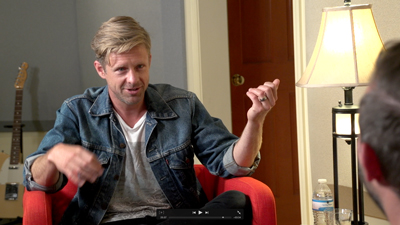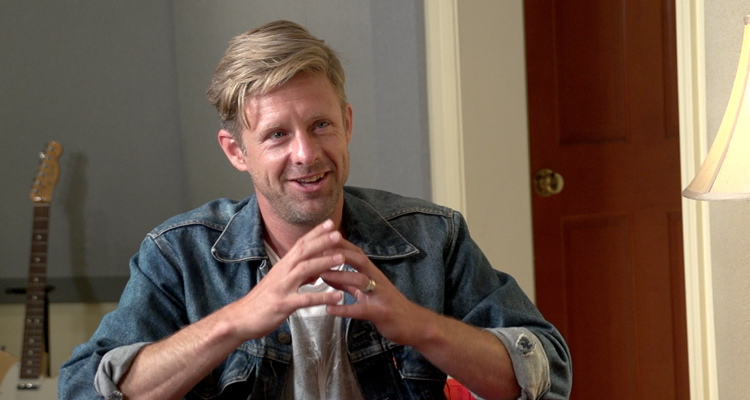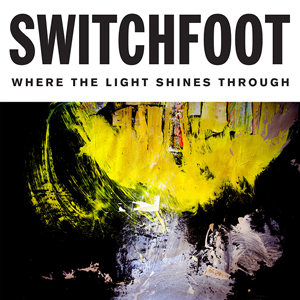RELATED CONTENT:
READ | Switchfoot – The Light Of Darkness, part 1
WATCH | Jon Foreman – Features On Film (1 of 2)
WATCH | Jon Foreman – Features On Film (conclusion)
CCM: We live in a culture where our wounds are fairly exposed. Racial. Religious. Whatever is causing us to divide. What is your role as a musician, as an artist, as a husband, father and a friend, in this world of woundedness?
JF: A personal hero of mine once told me that God doesn’t need a lawyer, my job is to be honest. Going back to the confession element, I don’t think we know how to fail. I don’t think it’s been modeled for us, and failure is the most universal experience that any human can have. How many people will actually win a gold medal at the Olympics, and how many people will fail trying?
I want to be—and this is a desire, not something I’ve figured out—someone who’s quick to say when I screwed up, to be able to admit wrongdoing. I think that’s important, especially within the church. If we can’t confess that we’re sinners, the truth is not in us. I mean, it’s scriptural. Anyone who says that he’s got it all figured out is telling a lie. It’s pretty black and white. So to be able to say, “No, I don’t have it figured out. I am a sinner, and I am in need of grace.” To be able to do that, and to build a culture that is built on not our own merit, our own abilities, but rather our need for grace, I think that would be my role as a musician, as a husband, as a father—to forgive and be forgiven.
CCM: What you’re talking about is humility, and what a motivating element of our humanity—to be humble. There’s a lyric from the new record: Ain’t we all just Abraham’s sons / Just sinners with a song and drums / We all fall on our knees and bleed the same. So we’re talking about this common denominator. We’re all people in need of redemption. Yet, in our Western World church culture, it seems our banners aren’t necessarily reflecting this heart of humility.
JF: Faith and issues of theology [are] very touchy because you’re talking about something very serious—[something that has] eternal consequences. And there’s fear involved. Some of that’s natural—maybe a holy reverence, a desire to get it right. [But] perfect love casts out all fear. So at some point, dare we hope that all men might be saved? Dare we hope in a big God who would actually love people that aren’t like me? Dare we hope that He might even forgive someone that doesn’t look and act like me? I don’t know. Maybe. Maybe God’s that big. And maybe there’s a dialogue there. But I think, for me, the dialogue begins by saying, “Wow, I’m most surprised that I’m let into the party.” You know what I mean? That’s where it starts for me.
CCM: Maybe God’s big enough to forgive someone, love someone, that doesn’t look like me. We’re talking about mystery, right? That we’re not dictating an answer, but opening up a conversation. How does mystery play into the creation of your music and how you interact with listeners?
JF: The big questions that we’re asking in our songs, it’s not play-acting. These are actual questions that I’m thinking about at three o’clock in the morning on a rock next to the Pacific Ocean. For me, I don’t believe in a God that I can fit in my back pocket on a piece of paper and say, “Quod erat demonstrandum. Here He is. Would you like to see my God?” [Then] fold him back up and say, “There, you’re wrong. I proved it.” I believe in a God that says, “Who are you? Tell him I Am that I Am.” It’s unsettling.
 Whenever I feel like I have God figured out, He reminds me that I don’t. When I think of the mystery, you go back to the humility of saying, “No, I don’t know, and I have something to learn from everyone.” And I do believe that there’s doctrine, I believe that there’s truth, but I don’t believe that truth is something that I possess to pull out and brag about and show other people how they’re wrong. I think truth is, rather, something that possesses me. And bigger than truth—love. I have been so deeply loved that it should transcend my actions.
Whenever I feel like I have God figured out, He reminds me that I don’t. When I think of the mystery, you go back to the humility of saying, “No, I don’t know, and I have something to learn from everyone.” And I do believe that there’s doctrine, I believe that there’s truth, but I don’t believe that truth is something that I possess to pull out and brag about and show other people how they’re wrong. I think truth is, rather, something that possesses me. And bigger than truth—love. I have been so deeply loved that it should transcend my actions.
CCM: Let’s take this back to music. Music is therapeutic. It gives us a penmanship for our feelings, our thoughts, our questions, our doubts. How does music allow you to work out these layers of life … spirit life, family life, music life?
JF: From the very beginning, music, for me, has always been an ability to talk about things I have no way to talk about otherwise. You could sum it up with God, girls, politics, and death—and maybe a few other topics—but things I don’t know how to talk about with my closest friends, let alone thousands of strangers a night. And music transcends and allows me to scream things that shouldn’t be whispered.
On this new record, talking about where the light shines through, these are stories and songs that we couldn’t have written at the beginning of this journey. Even more than that, the last solo project that I did (Sunlight, Shadows, Dawn, Darkness EP’s), 25 songs for 24 hours, where you’re chasing light around the clock and using it as a metaphor for faith and doubt and death, life, birth, all these things—polar opposites and extremities which we’re kind of pulled between as humans. That journey helped prepare this album of polarities. Where The Light Shines Through is an album that feels like it couldn’t have been written without that.
I always think of songwriting as archaeology. Everyday you get up and you dig. You get your guitar and you start digging. And sometimes you discover a McDonald’s wrapper and it’s just trash. Other times you discover this lost city that it’s been under your feet all along and you can’t really claim credit for it—it just happened. A good song doesn’t have my fingerprints on it. It feels like it transcends the moment and you take your shoes off and say, “Alright, there it is.”
CCM: If you stripped it all back, what is the core motivator for you to create music? To do what you do?
JF: I feel like there’s this great homesickness. With music, you can articulate these things. It’s about the conversation that begins when those honest utterances are brought to life. So whether I’m playing in a parking lot for thirty people after the show, or on stage with smoke and lights, the goal is conversation. Music can be that vehicle towards hope. Hope deserves an anthem. That’s why we sing.



Leave a Reply
You must be logged in to post a comment.